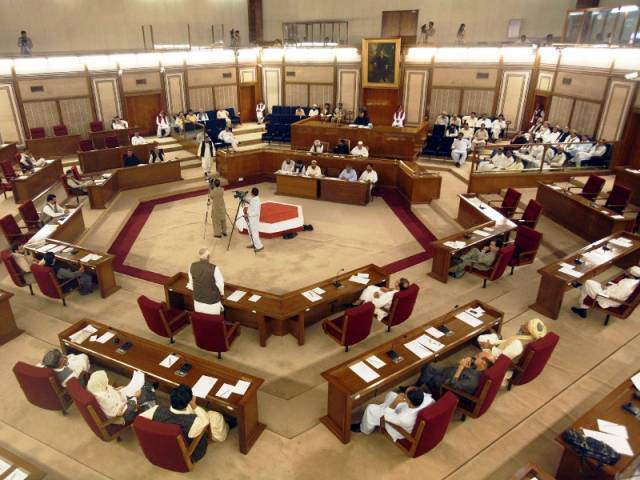Provincial Assembly passes Child Marriages Restraint Act 2025, introduces strict punishments for violators
The Balochistan Assembly. PHOTO: EXPRESS
The Balochistan Assembly has passed the Balochistan Child Marriages Restraint Act, 2025, introducing strictest penalties for those involved in child marriages. Under the new law, an adult male contracting a child marriage—and anyone who facilitates it—will face two to three years of rigorous imprisonment and a fine ranging from Rs100,000 to Rs200,000.
The law defines a child as any person under the age of 18 and declares all child marriages illegal—and in several circumstances, void ab initio, meaning invalid from the outset. The act overrides all conflicting laws in force across the province and takes effect immediately.
Strong penalties for offenders
Under the act, any adult male contracting a child marriage faces two to three years of rigorous imprisonment and a fine of Rs100,000–200,000.
Individuals who perform, arrange, promote, or abet a child marriage face the same punishment.
Courts may add an additional three-month imprisonment if fines are not paid.
Nikah Khawans, Nikah Registrars, and union council secretaries are now legally required to verify the Computerised National Identity Cards (CNICs) of both parties before solemnising a marriage. Failure to do so is a criminal offence punishable by up to one year imprisonment and a fine of up to Rs100,000.
All offences under the Act are cognizable, non-bailable, and non-compoundable—meaning police may act without warrants, bail cannot be granted easily, and cases cannot be settled privately. Only a First Class Judicial Magistrate can try offences.
The law also declares child marriages void if the minor is kidnapped, sold, enticed, compelled, or trafficked for marriage or immoral purposes. Children born from such marriages will be considered legitimate, and their maintenance will be the responsibility of the father.
Repeal of 1929 law
The act formally repeals the colonial-era Child Marriage Restraint Act of 1929 within Balochistan, though ongoing cases under the old law will continue until concluded. Under the new legislation, the provincial government must frame detailed rules within six months.
Opposition calls bill ‘un-Islamic’
Opposition lawmakers tore copies of the bill as it was tabled, claiming the legislation violates Islamic law. Speaking to the media after its passage, Chief Minister Sarfraz Bugti said a majority of assembly members supported the bill, reflecting the strength of the democratic process.
He noted that the bill underwent scrutiny by the assembly’s relevant committees over the past six months and was approved by the cabinet before being presented for a vote. “Differences of opinion are an inherent feature of democracy; however, legislation is always enacted in the best interest of the public,” Bugti said.
بلوچستان میں چائلڈ میرج ایک دیرینہ اور سنگین مسئلہ ہے اس کی روک تھام کے لئے آج بلوچستان اسمبلی میں اہم قانون سازی مکمل کی گئی ہے۔ یہ صرف ایک قانون سازی کا عمل نہیں تھا بلکہ بلوچستان کی بیٹیوں کے محفوظ اور صحت مند مستقبل کی بنیاد کا کام تھا۔
— Sarfraz Bugti (@PakSarfrazbugti) November 14, 2025
He emphasised that the government prioritises consensus-driven lawmaking, ensuring that all bills undergo extensive consultation and a transparent process. The chief minister reaffirmed his administration’s commitment to Balochistan’s development and the welfare of its citizens.
Opposition leader Younus Aziz Zehri criticised the legislation, reiterating that his party, JUI-F, would not support any law they believe violates Islamic teachings. Following their protest, opposition lawmakers staged a walkout while chanting slogans against the newly adopted bill.

